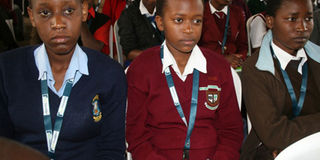You reap the leadership habits you sow

A section of students at Starehe Boys Centre during the annual KCB Scholars Mentorship programme. Don Miguel, a bestselling author, advocates that great leaders say only what they mean and stand by their word. PHOTO | WILLIAM OERI |
What you need to know:
- He advocates that great leaders say only what they mean and stand by their word. Great leaders do not use the power of their words to destroy others.
- The second agreement is that leaders should not take anything personally. He believed that people acted and spoke in alignment with their own reality.
- The last agreement is the essence of trying one’s best at all times.
Julian was writhing in pain as his colleagues drove him to the casualty area of the huge hospital. At first, he had ignored the pain on his left side, attributing it to indigestion.
However, as the morning progressed, the pain became unbearable. He had even taken some painkillers to no avail.
When Simon answered Julian’s urgent call, he found him on the floor writhing in pain. The short drive to the hospital seemed to take ages.
When Julian woke up, he was told that he had passed out. In addition, he was informed that he had been admitted by a senior doctor who seemed to recognise him.
Julian was not surprised that some of the doctors knew him. He had worked with a number of them before as a hospital administrator. He later learnt that had an infection in his left kidney.
At first, all the younger doctors were unable to pinpoint what was wrong with the elderly patient. It was Maarifa who suggested that they run a battery of tests on him.
Maarifa happened to have been one of Julian’s former students. Julian was very pleased to see her. He nodded to her and said: “I can see that my mentorship programme paid off. Who would have thought that I would fall into the hands of one of my own mentees?” They both laughed.
ADDING VALUE
Years ago, Julian had started a mentorship programme in the hospital, aimed at ensuring that all the professionals attained excellence in their areas of specialisation.
He often told his mentees: “Make sure that your actions add value. Remember, that each action is a seed that you plan for harvest in the future. If you plant bad seeds, don’t expect a huge harvest in the future.”
This was what a wise man, Og Mandino, once said: “Always do your best. What you plant now, you will harvest later.”
Throughout the world, great leaders have emphasised time and again the need for everyone to do their best. There is an inspirational story by Don Miguel Ruiz, known as “The Four Agreements”.
According to him, everyone who wants to transform their lives should live by the Four Agreements or Principles.
The first one is that great leaders use their words to build others and to speak the truth. Don Miguel called it being impeccable with your word, and speaking with integrity.
He advocates that great leaders say only what they mean and stand by their word. Great leaders do not use the power of their words to destroy others.
TRYING YOUR BEST
The second agreement is that leaders should not take anything personally. He believed that people acted and spoke in alignment with their own reality.
Therefore, one should not take offence when someone speaks ill of them.
The person is only projecting their own reality. This is an important skill for leaders because they will always find themselves on the receiving end of criticism and unfair judgement.
Thirdly, Don Miguel stated that great leaders should not make assumptions about anything. Instead, they should actively seek the truth about all the issues that face them.
This means having the courage to ask the tough questions and communicate as clearly as possible without fear.
It is also having the courage to articulate what they want. One of the sources of conflict in organisations is poor communication.
The assumption is that just because things are clear from the top, they should be as clear for everyone else by default.
The last agreement is the essence of trying one’s best at all times.
Don Miguel knew that if one genuinely tried their best, they would have few regrets. Doing one’s best frees the person from self-abuse and regret. Doing one’s best is a continuous process of self-awareness and improvement.




